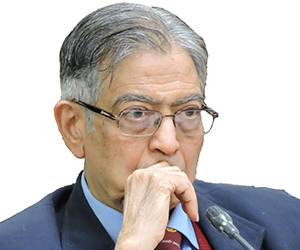India, following the re-election of the Modi Government, is to be commended for its sure footed firmness in its dealings with Pakistan.
Pakistan's repeated feelers for a resumption of talks have been rebuffed on the eminently legitimate ground that terror and talks cannot go together. In keeping with this principled approach, the Government refrained from inviting Pakistan for Modi's swearing-in ceremony, and by extending invitations to the BIMSTEC countries instead of the SAARC countries as done in 2014.
This was followed up by the absence of any substantive meeting between Modi and Imran Khan at the June 2019 Shanghai Cooperation Organisation (SCO) Summit in Bishkek. Furthermore, in his intervention at the Summit, Modi in a thinly veiled attack on Pakistan, asserted that in order to combat the menace of terrorism "all humanist forces should get out of their narrow realms and get together. Countries responsible for aiding, supporting and providing financial assistance to terrorists should be held accountable. SCO members should also effectively explore the capacity of SCO-RATS to eliminate terrorism. India calls for an international conference to combat the scourge of terrorism."
Equally importantly, in his bilateral meeting with Pakistan's all weather friend Xi Jinping, Modi was upfront and did not hesitate in pointing out that India's outreach to Pakistan had repeatedly been derailed by the latter, and in reiterating India's stand that before talks can resume Pakistan needs to take concrete action on our terrorism related concerns. Modi also did well not to overfly Pakistan on his way to Bishkek and instead opted for a much longer circuitous route skirting Pakistan, signifying that in our confrontation with Pakistan no quarter will be asked for and none will be given.
It is to be hoped that this firm approach witnessed in the opening days of the Modi Government 2.0 is sustained over the next few years and increasingly heavier costs are imposed on Pakistan for its use of terrorism against India. Sustaining such a policy over the long term is critical to its success, as Pakistan is unlikely to give-in anytime soon despite its many politico economic fragilities, as a few countries like China, Saudi Arabia etc. will be ready to bail it out at least over the short to medium term.
In these circumstances, Government must display the stamina over the next few years to resist the many pulls and pressures to cause India to revert to its earlier policy of engaging Pakistan even as the latter continues to bleed us. It will only be able to do so once it internalises the fact that Pakistan's inherently anti-Indian DNA, and not differences on issues like Kashmir, is the main impediment to normalisation of relations between the two countries. As Christine C Fair put it in her book titled, "Fighting to the End: The Pakistan Army's Way of War ", Pakistan's revisionism extends not merely to undermine the territorial status quo in Kashmir but to undermine India's position in the region and beyond. In sum, Pakistan's strategic culture is to ‘resist India's rise’.
Sustenance of its hard line approach towards Pakistan will also require the Government to avoid falling prey to Pakistani duplicity. Regrettably, earlier governments in India and even in the US have taken Pakistan's false commitments and assertions at face value. Pakistan's professions of goodwill and claims of actions against terrorist outfits which are a dime a dozen have never really been concretised into meaningful actions and the country continues to remain a breeding ground for terror. For instance, most recently in the face of the Financial Action Task Force’s (FATF) pressure, Pakistan has made out that it was taking action against terrorist outfits and has closed down over 700 seminaries run by them. Additionally, it has reportedly shared intelligence with India directly and through the US about possible terrorist attacks in Pulwama. Such moves by Pakistan are its standard operating procedure in these matters.
It is common knowledge that many terrorist outfits in Pakistan had been banned years ago only to re-emerge either under the same or another name and that their leaders continue to flourish to date. It is also well known that the charity arms of the Laskar-e-Taiba (LeT) and Jaish-e-Muhammad (JeM) are fully functional and they continue to collect funds. Pakistan's sincerity in giving up on its policy of using terror against us should be assessed not on the basis of its professions but on whether or not it was actually shutting down the infrastructure of terror in the country set up by it. If it is doing so, evidence of that would be apparent by the cessation of cross border terrorism, handing over of terrorist elements like Dawood Ibrahim and those involved in promoting Sikh separatism, bringing to book of the perpetrators of the Mumbai and of subsequent terror attacks in India, dismantling of terrorist oufits like JeM, LeT etc. and trial of their leaders. Short of such smoking gun evidence we should have no reason to believe that Pakistan is actually changing tack and is becoming a normal state with which a genuine normalisaton of ties is possible.
But apart from not being taken in by Pakistani duplicity, the Government also needs to disregard the calls of those in India and abroad who argue that we must remain engaged with Pakistan in order to bolster the civil society in Pakistan, to prevent hyphenation with Pakistan which could lead to third party mediation, to keep in mind Pakistan's nuclear capability and to maintain a measure of manoeuvrability. These are tired and specious arguments which need to be dismissed outright. Pakistan's civil society is a weak reed to lean upon and its mindset is not very different from that of its establishment when it comes to relations with India. Accordingly, bolstering Pakistani civil society will not be of any help to us.
Hyphenation with Pakistan which was a cause of real concern in the twentieth century is much less likely now given India's vastly greater comprehensive power as compared to the former.
As for third party mediation, because of our greater heft in international affairs, today we are in a position to reject it outright, and indeed, even demand that the international community take Pakistan to task for its export of terrorism. The threat posed to India by Pakistan's nuclear capability, while no doubt serious, is manageable given our deterrent capabilities.
The contention that India should remain engaged with Pakistan for purposes of maintaining diplomatic manoeuvrability and minimising volatility in the relationship makes little sense given that the nearly continuous engagement between the two countries for decades has not yielded any satisfactory results. In this context, we would do well to keep in mind that Pakistan has always done and shall always do its worst against us no matter what concessions we make. In these circumstances, it is only appropriate that we have jettisoned our traditional policy of accommodating Pakistan in favour of the one characterised by greater firmness.
Firmness shown by the Modi Government 2.0 in its dealings with Pakistan should be accompanied by a policy of imposing costs on the latter for its use of terror against us by all possible means - covert and overt, political and economic, diplomatic, and where required, military. As a first step in this direction India should pass an act of Parliament declaring Pakistan as a state sponsor of terror. This would, inter alia, not only lay down the ground rules for our policy of imposing costs on Pakistan but would also help promote its labelling as a pariah state in the international comity of nations.
(Amb Satish Chandar is a former Deputy National Security Advisor and is a member of VIF fraternity)
Image Source: https://twitter.com/juned_wani/status/962941029270761472











Post new comment